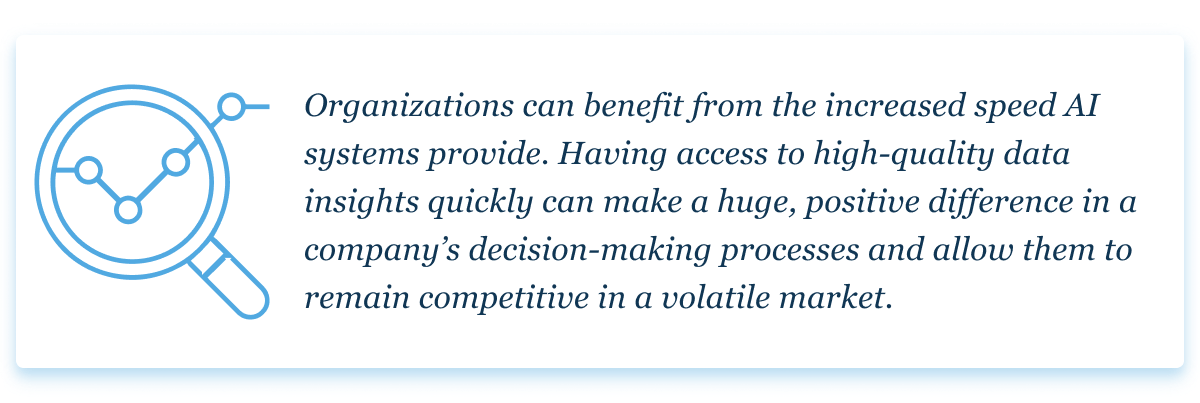In the Information Age, the world runs on data and lots of it. Artificial intelligence (AI) data management is becoming an essential tool for helping organizations to leverage the massive amount of data that is helping them make better business decisions and giving us a better sense of our world.
Human beings have substantial limitations when it comes to processing and managing data. It takes a person infinitely longer than a machine to go through a database manually, and they are more likely to miss critical connections.
This reality has led to the rise of corporate Big data use over the last decade, making it an essential activity for large companies across industries. Artificial intelligence, combined with the power of Big data, can lead to actionable insights in a fraction of the time.

Source: Unsplash
So, what does that mean for data management and AI? Essentially, AI is becoming the next big tool for companies with more data than they know what to do with.
Instead of relying on human processing power to make data usable, more organizations are turning to AI for data management so they can get the most out of the data they collect without hiring more data scientists. Here’s how AI is changing the way we think about data management.
The basics of data management
Data management encompasses all the activities required to effectively use data for the benefit of an organization. These activities include collecting the data, storing it, protecting it from unauthorized access, sorting it, and using it. Data preparation is a complex process that must respect data integrity for accurate analysis.
Automated systems capture a staggering amount of data each day, but only a small amount of this data is likely to be relevant or useful to data scientists and other data professionals. An organization might have a number of enterprise data sources it is drawing from, which can make the process of organizing and analyzing important data even more difficult.
What is AI-based data management?
Before data can be analyzed for insights, it must be collected, sorted, and prepared. While there are tools to help data analysts accomplish these tasks, Artificial intelligence can facilitate the process in many ways. As the global data load has grown from 1.2 petabytes generated in 2016 to 14.6 petabytes at the end of 2021, human processing power will not be able to keep up, and organizations will not be able to take advantage of all their most valuable data.
Artificial intelligence tools are automating many tasks for those involved in the data management process. According to technology leader IBM, there are several goals AI-based data management can accomplish, including:

AI isn’t taking over data management, at least not yet. But already, many organizations are finding that data management and AI are solving some of their biggest bottlenecks and helping them grow.
Data management and AI facilitate decision-making for organizations
Data science is a specialized field, requiring the expertise of data scientists who are trained in data management. However, business leaders often want to take a more active role in the process and gain direct access to high-quality insights as quickly as possible.
While AI tools can’t replace the need for data scientists to make insights accessible, they are making it easier to loop business leaders in and allow them access to the data they need to make informed decisions.

Source: Unsplash
Speed is critical—how AI and data management fit in
Companies have to make decisions quickly in our fast-paced world. Without efficient data processing and management, it’s difficult to pivot when needed. Real-time data is ideal, but it takes time for data scientists to process and analyze data so it can be used.
Artificial intelligence can take over many time-consuming activities relating to data management, allowing data scientists to work more efficiently. Some of the tasks, such as preparing and sorting data, are tedious and slow when done manually but are also extremely important. Most data experts would prefer to spend their time on more meaningful tasks, making AI assistance a major improvement to their day-to-day workflows.

AI connects data systems for better data management
Managing data assets can be tricky, as the number of data sources available to each organization grows. When data governance issues, such as regulations on the collection and use of data are involved, it becomes even more difficult to effectively use data.
Data catalogs, which offer an overview of different data sets available to analysts, are a helpful tool. But even more helpful is the ability of AI to connect data systems. This makes it much easier for data professionals to find the assets they need to develop powerful business insights. Using AI tools makes it easier to gain the full benefits of data assets and reduces errors.
AI in master data management
Master data management (MDM) is a method of unifying data and preventing duplication within an organization. This involves creating master records that act as the authority whenever there is a question about data accuracy. In data management, this is critical, since data coming in from a variety of sources gets messy very quickly.

Source: Unsplash
AI in master data management can use the MDM as a reference, which helps to reduce errors and improves accuracy. It can also help with efficiency and cost-saving since data that is not useful will not be referenced by the AI system.
AI in data cleansing
Research indicates that large enterprises lose an average of $15 million per year due to poor data quality. It’s no surprise that poor data leads to bad decisions. Data quality is very important in the analysis process, and companies that skimp on data preparation and data cleansing will not be getting the most accurate insights from their data.

Natural language processing helps with data analysis
One of the biggest advances in AI that has led to its effectiveness in automation is natural language processing. Now that AI is able to transform human language into data, it can be used to sift through different data sources in various formats to find links and insights. This is a powerful tool, as it allows more data assets to be used in decision-making.
Creating adaptable marketing strategies
Digital marketing has changed a lot since Big data tools have become accessible for businesses of all sizes. Data insights have taken a lot of the guesswork out of the marketing equation, making it easier for companies to optimize their strategies based on the behavior of a specific audience. AI-driven marketing can take these benefits even further.

Source: Unsplash
The online landscape is demanding, fast-paced, and always changing. With this in mind, AI and efficient marketing strategies work well together to improve ROI and create a more adaptable strategy. It can be hard to understand the intricacies of customer behavior, even for experienced data scientists. AI can help make those connections between data sets for advanced insights that can push an organization forward.
Inventory management with Artificial Intelligence data management
One of the biggest challenges product-based businesses face is how to optimize inventory. Making sure products are in stock when customers need them is key, but overstocking can lead to waste and additional costs, including storage expenses. Being able to predict demand via data and manage supply chains using AI system data predictions helps organizations improve their bottom line and avoid these issues. Inventory management for businesses is very costly, but AI can make it more efficient.
Product management for AI and data science is especially important as sustainability issues come to the forefront of international discussions. Costs aside, minimizing waste will help move sustainability initiatives forward and reduce the unnecessary use of natural resources.
AI in clinical data management
Companies across industries are dealing with huge amounts of data, and healthcare data is some of the most valuable and complex. Not only are there many sources of data, but the connections between these data can be difficult to see. Additionally, healthcare data is tightly regulated, due to its sensitive nature and patients’ privacy rights.
Artificial intelligence in clinical data management can help data scientists collect, store, and secure data so that it can be used properly, without violating applicable privacy laws. As clinical data can be used to better understand a huge range of health conditions, prevent errors, and reduce healthcare costs, this is an important application for AI software. Less data goes to waste with the use of AI and it can be managed more efficiently.

Healthcare data can also be used to track trends in community health, a task that requires speed and accuracy. As we saw during the beginning of the COVID-19 pandemic, any delay in a health emergency can lead to higher death tolls, misinformation, and other consequences.
AI in data center management
Data centers play an important role in today’s economy. Since data has quickly become one of the world’s most valuable assets, these centers will only grow in importance. In the data center context, AI can have a slightly different role than it does in business-focused data management.
AI in data center management can be used to manage larger and larger amounts of data while controlling costs. Efficiency is hugely important in the data center, as these facilities require huge amounts of power. AI can also help to ensure data security, which is always at risk.
AI and data management have a symbiotic relationship
Artificial intelligence relies on data. Machine learning gets “smarter” by processing more and more data, which refines its ability to carry out necessary tasks. With organizations bringing in more and more data all the time, it’s a symbiotic relationship with many benefits. Data management, for AI development, provides access to a wealth of data from a range of sources.
AI-driven data processing will likely advance quickly, simply due to the massive amount of data that is now available. These systems can learn from large datasets in a very short time and become even more effective. That will push organizations in a range of industries to new levels of understanding in short order.
New innovations for AI in data management—will data scientists be needed?
With so many reasons to use Artificial intelligence data management tools, it’s not surprising that large companies have already invested in the infrastructure to leverage this powerful relationship. Despite this interest and level of investment, however, we’re a long way from fully automated systems that will process data and eliminate the need for human intervention.

Source: Unsplash
The fields of AI and machine learning are becoming more and more advanced all the time, but innovations so far in data management AI have continued to focus on assisting human analysts and freeing up their time for the more complex tasks. For data scientists, that’s good news—they will be more effective in their roles and better able to provide accurate information that will guide the future of their organizations. Some data scientists might shift from working full-time for an organization to becoming data science consultants, which offers more flexibility and freedom while allowing them to help more businesses succeed.
AI software development is driven by talented people who are constantly exploring new opportunities that can help businesses serve their customers and improve their revenue. While only the largest businesses have the budget to implement these cutting-edge solutions right away, they will eventually become more accessible, even for small business owners. With AI taking over many of our world’s data management tasks, we’ll be able to look at our world from angles that have never been considered.
Author bio
Ryan Ayers has consulted a number of Fortune 500 companies within multiple industries including information technology and Big data. After earning his MBA in 2010, Ayers also began working with start-up companies and aspiring entrepreneurs, with a keen focus on data collection and analysis.
Efficient AI data management for your business
Schedule an intro consultation with our Machine Learning engineers to see how we can ease up your data management.



